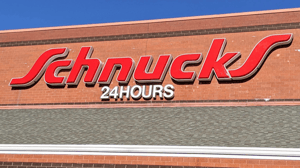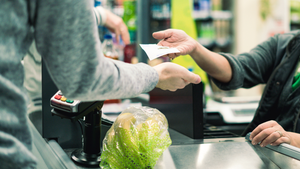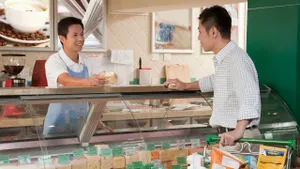Instacart launches in-app safety hub for personal shoppers
ADT-powered ‘get assistance’ button connects delivery workers to emergency services
May 22, 2020

Instacart has partnered with security firm ADT to launch a “safety hub” in its app for personal shoppers that puts them in contact with emergency services in times of need.
Along with the safety tool, San Francisco-based Instacart announced other new app features yesterday, including shopper identity verification, updated contactless delivery for alcohol and prescriptions, and perks such as discounts on cell phone coverage and roadside assistance.
The hub makes it easier for shoppers to navigate safety tools, resources, and guidelines available to them in the app, Instacart said. Powered by the Safe by ADT mobile platform, a new “get emergency assistance” button connects shoppers to emergency services if they need aid while picking and delivering online grocery orders and shares data such as GPS location to direct responding personnel.
Besides the emergency button, the hub offers an incident reporting tool that enables shoppers to more easily report an issue that may occur while shopping or making a delivery. Shoppers also can access resources about third-party safety organizations, shopper injury protection and guidelines on shopping and delivering safely.
Instacart said the new in-app safety hub is now available to all shoppers, with features rolling out over the coming weeks.

The ADT-powered
“Shoppers play an important role, helping deliver customers their groceries and goods during this time of need. The health and safety of the entire shopper community remains a top priority, and it’s critically important we continue to evolve our offerings for shoppers to ensure they have the personal protective equipment and resources they need inside and outside of the aisles to help keep them safe,” Instacart President Nilam Ganenthiran said in a statement. “These new features, safety tools and resources we’re introducing today will help ensure shoppers have the support they need both during and long after the COVID-19 crisis.”
Boca Raton, Fla.-based ADT said its Safe by ADT solution, once activated in the Instacart Shopper app, allows the online grocery giant’s more than 500,000 personal shoppers to “quickly and discreetly” signal for help anytime they feel unsafe.
In connecting shoppers to emergency services, the tool share incident details such as GPS location, identity and other partner-specified data, such as trip or task details, which ADT noted can be critical when shoppers are unfamiliar with their surroundings or unable to describe their location to a dispatcher. The safety feature also enables emergency services to continually track the shopper, even if they moved after the initial alert.
“The ADT mobile safety solution integrates seamlessly into the Instacart Shopper app, providing peace of mind and safety to on-the-go shoppers and their customers,” commented Leah Page, vice president of mobile security and strategic projects at ADT. “We believe everyone has the right to feel safe, and through this partnership, we’re proud to help protect Instacart’s shopper community.”
And that community has grown by leaps and bounds during the coronavirus pandemic. In late April, Instacart said it aims to hire 250,000 more full-service personal shoppers over the coming months to help meet skyrocketing demand for online grocery delivery. A month earlier, the company announced plans to hire 300,000 new full-service shoppers and met that goal just weeks later, which expanded its shopper community to more than 500,000 people. At the time, Instacart reported that order volume had jumped more than 500% year over year, with the average customer basket size growing 35%.
Before the COVID-19 crisis, Instacart had about 130,000 full-service shoppers and 12,000 in-store shoppers to fulfill online grocery orders for same-day delivery or pickup.
Instacart said it’s also investing in keeping personal shopper accounts secure. The company yesterday introduced shopper ID verification, a new authentication method to help make sure shopper accounts are valid. While shopping or delivering a batch, shoppers will be periodically prompted to take a photo of themselves, which will ensure that the person using the account is the same individual whose photo is on file. Instacart said this tool will prevent shopper accounts from being used by unauthorized people, in turn enhancing security for the entire Instacart platform.
In upcoming weeks, Instacart also aims to roll out a new contactless delivery option that will no longer require personal shoppers to scan a customer’s ID upon delivering alcohol or prescriptions. The shopper can simply review the ID and signature that customers scan from their own device and then verify that the ID matches, while standing apart at a safe, six-foot distance, the company said.
Instacart added that it’s continuing to invest in perks that benefit personal shoppers beyond the pandemic, including new partnerships with Sprint, CarAdvise and Good Sam. The new offerings will provide shoppers with savings on cell phone coverage, car maintenance and roadside assistance. The company said each of the new perks is being offered based on direct feedback from Instacart shoppers and will help them save money on some of their most frequent expenses.
Over the last few months, Instacart has introduced more than 15 new product features, as well as new health guidelines, contactless delivery options, shopper bonuses, and sick leave policies, as well as pay for those affected by COVID-19.
About the Author
You May Also Like






